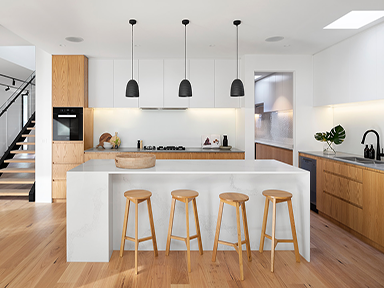If you rent your holiday home on a platform like Airbnb, you may be wondering how to protect it with insurance. Will a normal home and contents policy do? Or do you need something a bit more specialised? Read on for the answer…
Late last year, the Real Estate Institute of Australia (REIA) crunched the numbers and found there were 133,968 ‘short-stay’ accommodation places in Australia in the March 2023 quarter. The Short Stay Accommodation Study also found that the number of ‘short-stay’ properties across the country had shot up 22.8 per cent over the year – indicating that an increasing number of owners were offering their properties in this market.
If you’re one of these ‘short-stay’ landlords, or thinking of becoming one, it’s important to protect your investment with the right insurance.
But before we get into the insurance nitty-gritty, let us be clear about what we mean by a ‘short-stay’ (or short-term) landlord. If you’re an owner who offers their investment property or holiday home on a platform for periods of one day to six months at a time, then you’re a ‘short-stay’ landlord.
That sorted, back to the insurance matter.
If you’re a ‘short-stay’ landlord, you’ll need and want cover to financially protect against an array of key risks, including:
-
Damage caused by severe weather/natural disasters (storms, floods, bushfires, cyclones, earthquakes) and other perils like fire, water damage (e.g. burst water pipes) and impact from a vehicle or similar.
-
Theft or attempted theft.
-
Loss of rent.
-
Legal liability.
Let’s dig a little deeper into each of these areas so you know exactly what you are looking for when comparing cover…
Damage caused by severe weather and other events
Some insurance providers do not offer any protection for the property against any event that is not directly related to hosting. So, if you took out an option that excluded this type of cover, and your property were to be damaged from a natural disaster, you would need to look to your home and contents (or similar) policy in respect to cover for insured events. But – and this is a big but – you’ll only be able to claim if your insurer provides cover if the property is being used for ‘short-stay’ rentals. Many standard home and contents policies have an exclusion which relates to using the property for income-generating purposes or other exclusions.
RentCover ShortTerm: EBM RentCover offers a policy the covers damage caused by severe weather and other insured events. Cover up to $70,000 for contents and up to the sum insured for the building is provided for fire damage, natural disasters and water damage.
Theft
An insurance provider may only offer theft cover if it applies to theft by the guests or their invitees. Oftentimes, there is no cover for third-party (e.g. burglar) theft. So, say your property is sitting vacant between hosting, if you don’t have the right cover in place, you could be left out of pocket if your home is burgled.
RentCover ShortTerm: Cover for theft and attempted theft by guests (and their invitees) and third-parties is offered by EBM RentCover.
Loss of rent
Several insurance providers will provide lost income cover if the host needs to cancel confirmed bookings due to damage caused by a guest (or their invitees) only. However, sometimes other events happen that leave a property unable to be occupied. This includes natural disasters. Say a cyclone impacts a property and damages it to the point where a confirmed booking is unable to occupy the home. Without the right insurance, you will not be able to recoup the lost income.
RentCover ShortTerm: Up to $50,000 is provided to cover the loss of income when confirmed bookings need to be cancelled because guests are unable to stay in the property following previous guest damage or an insured event (e.g. severe weather damage, fire or water damage). For example, if the property cannot be occupied due to damage caused by a natural disaster, the landlord can claim on the income they would have received for the confirmed booking had the property not been uninhabitable (note: landlords can only claim for already confirmed bookings).
Legal liability
Most policies should include liability cover – this is arguably one of the most important features of a landlord insurance policy as claims for this type of event can reach into the tens of millions of dollars. Liability insurance typically covers the host if they are found legally responsible for bodily injury to a guest or others. When searching for cover for a holiday home, the policy should ideally offer cover if the guest or another dies because of the liability and should be in place when there are no guests. Why? Well say a person has to access the property between guests, and because of a fault at the property, they are injured badly. The person can claim for damage, if it is the fault of the landlord. With the right type of cover, the landlord can look to their insurance to cover this.
RentCover ShortTerm: Up to $20 million is offered to cover the landlord’s legal liability if a guest or any other person legally on the premises has their property damaged or is injured or dies because of the landlord’s negligence. The cover remains in effect during the duration of the policy (meaning cover is provided even when there are no guests in residence).
In addition to these key risks, RentCover ShortTerm offers additional cover and benefits including:
-
Death of a guest – protection for lost rent on confirmed bookings after the death of a tenant, including murder and suicide.
-
Accidental guest damage – accidental damage is the result of sudden, unexpected or unforeseen events (such as a child scribbling on the walls with a permanent marker).
-
Malicious guest damage – malicious means it was caused on purpose with intent to do harm, motivated by vindictiveness or spite with the aim of damaging the property (such as punching a hole through a door).
-
Pet damage – cover for damage to fixed contents and building caused by a guest's domestic pet kept at the property.
-
Tax audit expenses – covers costs of an audit in connection to the ownership of the insured property. This means, during any one period of insurance, if there is an investigation into a return lodged with the Commissioner of Taxation in relation to an investment property insured with us, we will cover up to $1,000 per audit (if more than one audit occurs, we will pay out a maximum of $2,000 combined).
Given the limitations of cover offered by certain providers, short-stay landlords would be wise to protect their investment by securing specialised landlord insurance that is tailored to the short-term market. If you have questions about RentCover ShortTerm or our other landlord policies, have a chat with a member of our Expert Care team.
*While we have taken care to ensure the information above is true and correct at the time of publication, changes in circumstances and legislation after the displayed date may impact the accuracy of this article. If you need us we are here, contact 1800 661 662 if you have any questions.
You may also like
View all
A lot has changed in the short-term accommodation market over the past decade. This is what you need to know...

When you’re renting your investment property short-term, not just any insurance policy will do…

What type of property insurance do you need if you're tapping into the short-stay accommodation market? We explain here...



